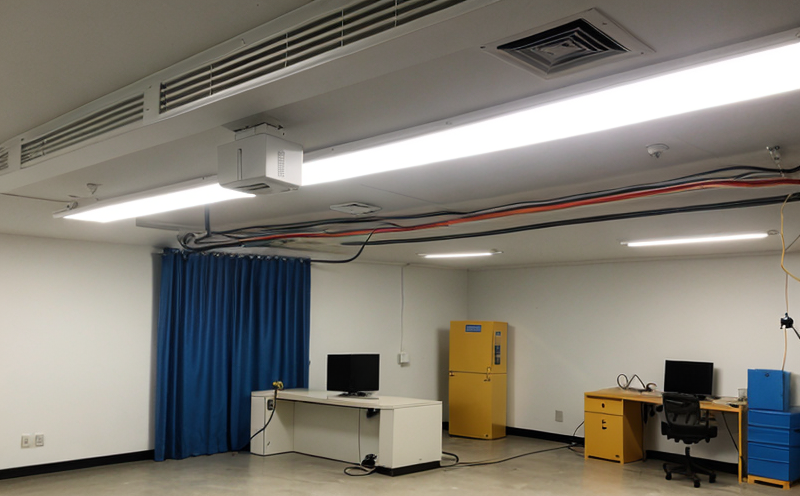IEC 61347-2-2 Lamp Control Gear Testing
The IEC (International Electrotechnical Commission) standard 61347-2-2 is specifically focused on the safety, performance, and electromagnetic compatibility of lamp control gear. This critical testing ensures that lighting systems in buildings and infrastructure are safe for use and comply with global regulatory standards.
Lamp control gear (LCG) plays a crucial role in the operation of electric lamps within various sectors such as commercial buildings, industrial facilities, and public infrastructure projects. Ensuring that LCG meets stringent safety requirements is paramount to protect human health and avoid potential hazards. For instance, improper functioning or design flaws can lead to fire risks, electrical shocks, and other dangerous situations.
The IEC 61347-2-2 standard covers a wide range of tests for lamp control gear, including:
- Thermal stress testing
- Electrical insulation testing
- Mechanical strength verification
- Emission and interference testing to ensure electromagnetic compatibility (EMC)
- Operational efficiency evaluation
- Overload protection checks
- Voltage regulation assessment
- Compatibility with smart lighting systems
The testing process involves rigorous procedures that simulate real-world conditions under which the lamp control gear will operate. This includes high and low temperature cycling, vibration tests, and power supply variations to ensure durability and reliability.
Compliance with IEC 61347-2-2 is mandatory for manufacturers seeking to penetrate global markets, especially in regions like Europe, Asia, and North America where strict standards are enforced. Failure to meet these requirements can result in product recalls, legal disputes, and significant financial losses.
For quality managers and compliance officers, ensuring that their products adhere to this standard is essential for maintaining a strong reputation in the market and avoiding regulatory penalties. R&D engineers benefit from thorough testing as it allows them to refine designs before mass production begins. Procurement teams can also leverage IEC 61347-2-2-compliant components to enhance product quality throughout the supply chain.
Why It Matters
The importance of IEC 61347-2-2 Lamp Control Gear Testing cannot be overstated. Compliance with this standard ensures that all lighting systems are safe and reliable, reducing the risk of accidents and injuries in both residential and commercial settings.
- Reduces Fire Risks: Proper testing helps identify potential fire hazards associated with faulty lamp control gear.
- Promotes Safety: Ensures that all lighting systems meet strict safety standards, protecting users from electrical shocks or other dangers.
- Enhances Product Quality: Rigorous testing improves the overall quality of products by identifying and addressing design flaws early in the development process.
- Avoids Legal Issues: Compliance with international standards can prevent costly legal battles related to product liability.
In addition, adhering to IEC 61347-2-2 enhances a company’s reputation among consumers and stakeholders, making it more attractive for potential clients and investors. This standard also promotes interoperability between different lighting systems within a building or infrastructure project, facilitating seamless integration of smart technologies.
By prioritizing compliance with IEC 61347-2-2, organizations demonstrate their commitment to excellence in product design and manufacturing practices. This not only fosters trust among customers but also contributes positively to the overall safety and efficiency of buildings and infrastructure projects.
Scope and Methodology
The scope of IEC 61347-2-2 Lamp Control Gear Testing encompasses all aspects of lamp control gear, from its initial design through to final assembly. This ensures that every component is thoroughly examined for compliance with the specified standards.
The methodology involves several key steps:
- Initial Design Review: Evaluating the design plans and specifications against the requirements outlined in IEC 61347-2-2.
- Material Selection: Assessing the materials used to construct the lamp control gear for their suitability and safety.
- Prototype Testing: Conducting initial tests on prototypes to identify any potential issues before full-scale production begins.
- Manufacturing Process Verification: Ensuring that the manufacturing process adheres strictly to the defined standards.
- Final Product Testing: Performing comprehensive testing on finished products to confirm compliance with all relevant provisions of IEC 61347-2-2.
The testing procedures are designed to cover various operating conditions, including extreme temperatures, humidity levels, and voltage variations. This ensures that the lamp control gear performs consistently across different environments and applications.
For R&D engineers, these tests provide valuable insights into how their designs perform under real-world conditions. They can use this information to make necessary adjustments or improvements before finalizing the product design.
Environmental and Sustainability Contributions
- Energy Efficiency: By ensuring that lamp control gear operates efficiently, IEC 61347-2-2 promotes energy savings in buildings and infrastructure projects. This contributes positively to reducing carbon footprints.
- Resource Conservation: Properly designed and manufactured lamp control gear helps conserve resources by minimizing waste during production processes.
- Waste Reduction: Compliance with this standard encourages the use of recyclable materials, thus reducing electronic waste and promoting sustainable practices.
In summary, IEC 61347-2-2 Lamp Control Gear Testing plays a vital role in enhancing both environmental sustainability and overall safety across various sectors. Its rigorous testing procedures not only ensure product quality but also contribute significantly to the long-term health of our planet.





